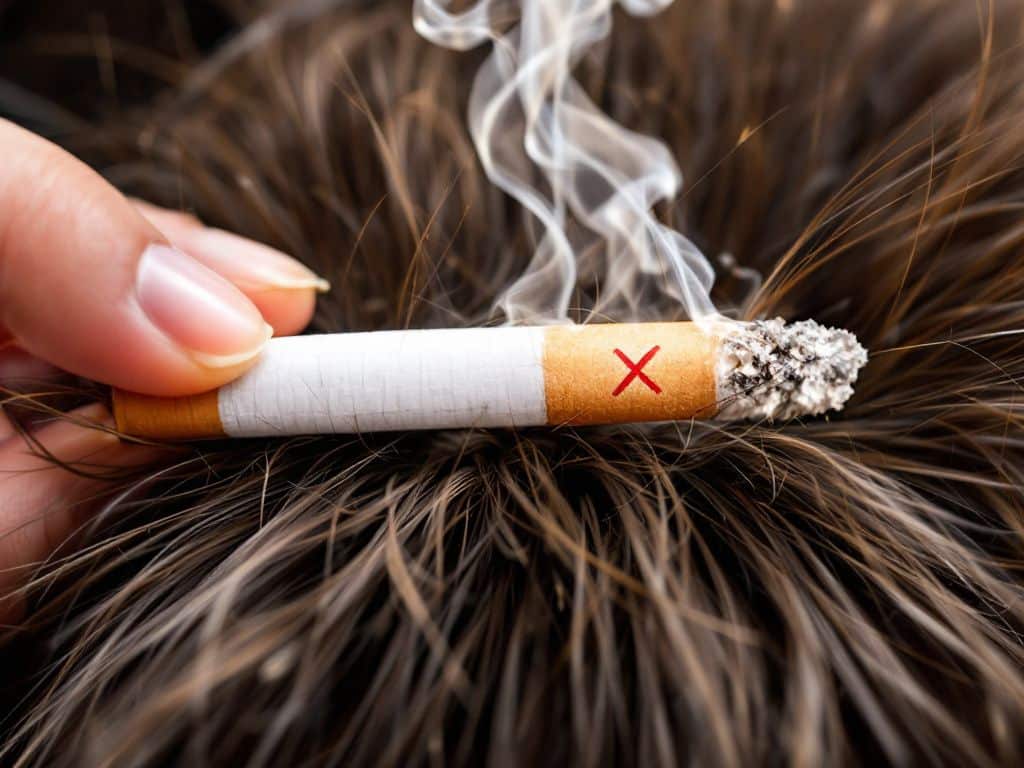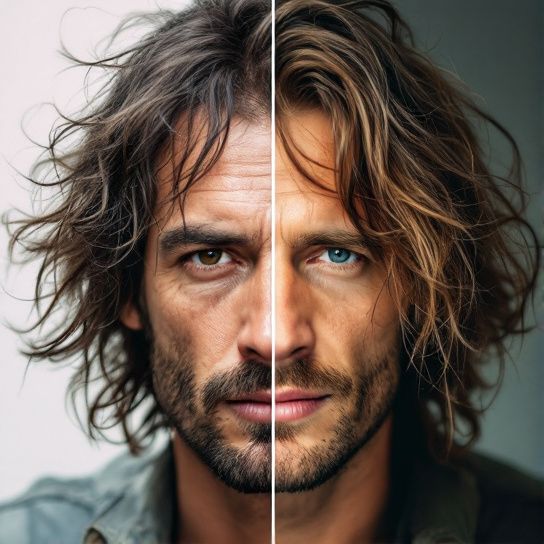
Ever noticed how some people can have seemingly luscious hair despite years of wear and tear, while others struggle with thinning, dull strands? If you’ve been wondering why your hair might not be living up to its full potential, here’s a thought to chew over: could smoking be the culprit behind hair loss? It’s not something we often discuss when we think about the visible impacts of our habits, but smoking and hair health are more connected than we might like to admit.
The Invisible Connections: Smoking and Hair Loss
So, what’s the deal with smoking and hair loss? It’s a question I found myself pondering after hearing a friend rant about how her once-thick hair was suddenly as flat as an old balloon. She had a history of smoking, and it got me questioning what role tobacco products play in hair vitality.
First things first, let’s acknowledge a core issue. Smoking isn’t just about the apparent wrinkles or stained teeth. It’s way deeper. When you smoke, it’s not just a few chemicals you’re puffing into your system. Nope, we’re talking about a grand orchestra of toxins. And they play a pretty mournful tune on your hair follicles. The link between smoking and hair loss is largely pinned down to reduced blood circulation, inadequate nutrient supply, and increased follicle damage.
Tobacco Effects on Circulation and Hair Follicles
Now, imagine your hair follicles as tiny, hardworking factories on your scalp. They require a consistent and healthy blood flow to function optimally. But smoking? Well, it throws a wrench in the system. It narrows your blood vessels, which means your scalp’s blood supply takes a hit, reducing nutrient flow and eventually causing those follicles to shrink. This results in less hair growth and promotes an environment where hair loss can thrive. Think of it as putting your hair pits on a no-growth diet.
But wait, there’s more—the star cast here includes carbon monoxide and nicotine, common toxic players when you light up a cigarette. Both these chemicals actively reduce the oxygen content in your blood. Less oxygen means less nutrient-rich blood for each of those bustling little hair factories. That’s a double whammy right there!

The Red Flags: Signs Smoking Is Affecting Your Hair
If you’re reaching for your scalp right now, gently poking at your follicles, and getting wary about your smoking habits, stay with me. Here are a few tell-tale signs smoking could be impacting your hair health:
- Thinning Hair: Obviously, losing more strands than usual is often the first noticeable sign.
- Dull Appearance: If your once shiny locks have lost their luster, smoking could be a contributor by robbing your hair of essential oils that keep it healthy and shiny.
- Slow Growth Rate: Spotting those roots taking ages to appear after coloring weeks back? Smoking could be slowing down new growth.
- Increased Gray Hair: Smoking increases oxidative stress, which has a hand in premature graying.
But before we sink into despair about all this doom and gloom, let’s chat about solutions that are actually within reach.
Kicking the Habit: Why It Matters for Your Hair
It can be daunting to think of quitting smoking, especially if it’s been a part of your routine for a while, like that comforting cup of coffee in the morning. But, when it comes to your mane, the sooner you quit, the better your chances of salvaging your hair health. There’s a myriad of benefits that ripple through your system when you decide to ditch the smokes—for instance, enhanced blood circulation comes back to the scene, better nutrient and oxygen supply to your follicles, and an eventual rejuvenation of hair growth processes.
Tackling Nicotine Withdrawal for Better Hair Health
Kicking the nicotine habit is no small feat, so let’s talk strategies. The quit journey can feel like you’re scaling Mount Everest with greased gloves. Difficult, not impossible. Here’s how you can start:
- Set a Quit Date and Stick to It: Having a clear deadline can help galvanize you. Write it in big, bold letters, and keep glancing at the date.
- Identify Triggers: Keep track of situations sparking the urge to smoke. Is it stress, boredom, or social situations? Knowing this helps in tackling them better.
- Find Alternatives: Replace holding a cigarette with a stress ball or find relaxing activities to break the habit chain.
- Seek Support: Talk with friends, family, or join quit-smoking groups. For many, strength in numbers works wonders.
Imagine waking up with a full head of healthier hair slowly emerging—a result from maintaining oxygen-rich, blood-pumping follicles ready to push out stronger, shinier hair. So, trust me, your hair will thank you when you finally quit.

Supporting Healthy Hair Post-Smoking
Okay, we’ve tackled the need to boot smoking out of your life, but what about restoring hair health once the habit is pact history? Don’t fret, I’ve got that covered too! Here are some nurturing habits that’ll say ‘hello’ to healthier hair:
Recommended Hair Care Practices
- Scalp Massage: Spend a few moments daily giving your scalp a gently good rub. It helps stimulate circulation and boosts your hair growth.
- Balanced Diet: Don’t underestimate the prowess of proteins and vitamins. Include biotin-rich foods, omega-3 fatty acids, and plenty of vegetables. They’re like a hair growth cocktail.
- Hydrate!: Basic but powerful, water flushes out toxins, sending a rejuvenating cleanse through your system, meanwhile ensuring ample moisture reaches your hair.
- What You Touch Matters: Be gentle with heat styling. Opt for cooler settings, and always, always use a heat protectant.
Secondary auxilaries: Professional Treatments

If you’re nodding along but fearing brushing will still show strands left behind, professional interventions might be worth a shot. Hair masks, specific treatments, or consulting with a trichologist who can prescribe supplements might just be your pixie dust.
Keep the Conversation Going
We’ve covered quite the hair-worthy treasure trove today. But I implore you to not only absorb this information but also open dialogues with friends who are smokers. It could mean the world—not just for their lungs, but yes, for their hair too.
Whatever your reason for reading this, the changes you make can affect not just the strands on your scalp but your overall health trajectory. Let’s admit, the journey of quitting is tough, no sugar-coating there. However, with every nudge forward, you empower not just your follicles but yourself to a healthier, more energetic version of your being. That’s a win all around!
So, if you ever find yourself glancing in the mirror, running fingers through once-wilted strands, remember the impact right choice can have, unlocking revitalized locks slow to unfurl. You’ve got this!
Frequently Asked Questions
Does Smoking Cause Hair Loss?
Yes, smoking has been linked to hair loss. Studies have shown a strong correlation between consistent smoking and early-onset androgenetic alopecia, a form of hair loss that affects both men and women[1][3][5).
How Does Smoking Cause Hair Loss?
Smoking causes hair loss through several mechanisms, including oxidative stress, reduced blood flow to hair follicles, microinflammation, and damage to the immune system. Smoking also leads to vasoconstriction, DNA damage, and hormonal imbalances that can accelerate hair loss[1][3][5).
Can Quitting Smoking Help Reverse Hair Loss?
Quitting smoking can help improve hair health, although it may not fully restore lost hair. Stopping smoking reduces oxidative stress, improves blood flow to hair follicles, and enhances overall health, which can help in maintaining the remaining hair and potentially promoting healthier hair growth. However, hair that has already been lost due to male pattern baldness may not grow back[1][4][5).
How Long Does It Take to See Improvements in Hair Health After Quitting Smoking?
Improvements in hair health can be seen after quitting smoking, but the extent and timing vary. Significant improvements in cardiovascular health, which can benefit hair follicles, can be observed within a month of quitting. However, for noticeable improvements in hair growth and health, it may take several years of being smoke-free[1][4][5).
References


Leave a Reply